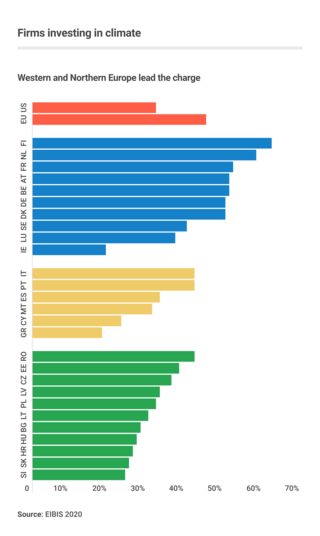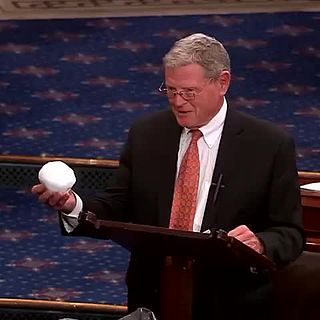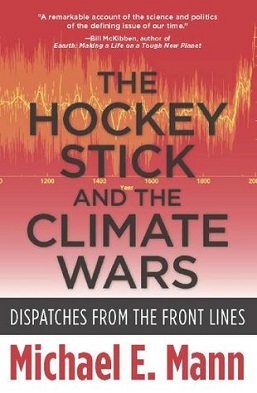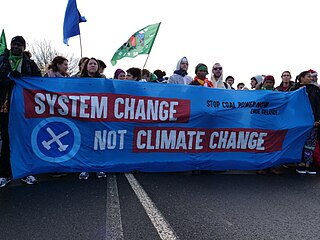Myron Ebell is an American climate change denier who served as the Director of Global Warming and International Environmental Policy at the Competitive Enterprise Institute (CEI), an American libertarian advocacy group based in Washington, D.C. He was also chairman of the Cooler Heads Coalition, a politically conservative group formed in 1997 focused on "dispelling the myths of global warming by exposing flawed economic, scientific, and risk analysis". In September 2016, Ebell was appointed by then Republican presidential candidate Donald Trump to lead his transition team for the United States Environmental Protection Agency (EPA).
The American Petroleum Institute (API) is the largest U.S. trade association for the oil and natural gas industry. It claims to represent nearly 600 corporations involved in production, refinement, distribution, and many other aspects of the petroleum industry.

The politics of climate change results from different perspectives on how to respond to climate change. Global warming is driven largely by the emissions of greenhouse gases due to human economic activity, especially the burning of fossil fuels, certain industries like cement and steel production, and land use for agriculture and forestry. Since the Industrial Revolution, fossil fuels have provided the main source of energy for economic and technological development. The centrality of fossil fuels and other carbon-intensive industries has resulted in much resistance to climate friendly policy, despite widespread scientific consensus that such policy is necessary.

Business action on climate change is a topic which since 2000 includes a range of activities relating to climate change, and to influencing political decisions on climate change-related regulation, such as the Kyoto Protocol. Major multinationals have played and to some extent continue to play a significant role in the politics of climate change, especially in the United States, through lobbying of government and funding of climate change deniers. Business also plays a key role in the mitigation of climate change, through decisions to invest in researching and implementing new energy technologies and energy efficiency measures.

Joseph J. Romm is an American researcher, author, editor, physicist and climate expert, who advocates reducing greenhouse gas emissions to limit global warming and increasing energy security through energy efficiency and green energy technologies. Romm is a Fellow of the American Association for the Advancement of Science. In 2009, Rolling Stone magazine named Romm to its list of "100 People Who Are Changing America", and Time magazine named him one of its "Heroes of the Environment (2009)", calling him "The Web's most influential climate-change blogger".

Are We Changing Planet Earth? and Can We Save Planet Earth? are two programmes that form a documentary about global warming, presented by David Attenborough. They were first broadcast in the United Kingdom on 24 May and 1 June 2006 respectively.

Climate change denial is a form of science denial characterized by rejecting, refusing to acknowledge, disputing, or fighting the scientific consensus on climate change. Those promoting denial commonly use rhetorical tactics to give the appearance of a scientific controversy where there is none. Climate change denial includes unreasonable doubts about the extent to which climate change is caused by humans, its effects on nature and human society, and the potential of adaptation to global warming by human actions. To a lesser extent, climate change denial can also be implicit when people accept the science but fail to reconcile it with their belief or action. Several studies have analyzed these positions as forms of denialism, pseudoscience, or propaganda.
This is a list of climate change topics.

350.org is an international environmental organization addressing the climate crisis. Its stated goal is to end the use of fossil fuels and transition to renewable energy by building a global, grassroots movement.
John D. Hamaker (1914–1994), was an American mechanical engineer, ecologist, agronomist and science writer in the fields of soil regeneration, rock dusting, mineral cycles, climate cycles and glaciology.

Individual action on climate change is about personal choices that everyone can make to reduce the greenhouse gas emissions of their lifestyles. Such personal choices are related to the way people travel, their diet, shopping habits, consumption of goods and services, number of children they have and so on. Individuals can also get active in local and political advocacy work around climate action. People who wish to reduce their carbon footprint, can for example reduce their air travel for holidays, use bicycles instead of cars on a daily basis, eat a plant-based diet, and use consumer products for longer. Avoiding meat and dairy products has been called "the single biggest way" how individuals can reduce their environmental impacts.

The Hockey Stick and the Climate Wars: Dispatches from the Front Lines is a 2012 book about climate change by the American climatologist and geophysicist Michael E. Mann. In the book Mann describes how he became a researcher investigating the temperature record of the past 1000 years and was lead author, with Raymond S. Bradley and Malcolm K. Hughes, on the 1999 reconstruction that was the first to be dubbed the hockey stick graph. He concisely explains the basics of climate science including statistical methodology dealing with paleoclimate proxy data, and examines the tactics which opponents of action on climate change use to distort the science and attack the reputations of climate scientists. The book describes both this controversy and the broader context of skepticism in science and contrarians rejecting evidence of human influence on climate.

The climate movement is a global social movement focused on pressuring governments and industry to take action addressing the causes and impacts of climate change. Environmental non-profit organizations have engaged in significant climate activism since the late 1980s and early 1990s, as they sought to influence the United Nations Framework Convention on Climate Change (UNFCCC). Climate activism has become increasingly prominent over time, gaining significant momentum during the 2009 Copenhagen Summit and particularly following the signing of the Paris Agreement in 2016.

From the 1980s to mid 2000s, ExxonMobil was a leader in climate change denial, opposing regulations to curtail global warming. For example, ExxonMobil was a significant influence in preventing ratification of the Kyoto Protocol by the United States. ExxonMobil funded organizations critical of the Kyoto Protocol and seeking to undermine public opinion about the scientific consensus that global warming is caused by the burning of fossil fuels. Of the major oil corporations, ExxonMobil has been the most active in the debate surrounding climate change. According to a 2007 analysis by the Union of Concerned Scientists, the company used many of the same strategies, tactics, organizations, and personnel the tobacco industry used in its denials of the link between lung cancer and smoking.

The Climate Mobilization (TCM) is a grassroots environmental advocacy group working toward large-scale political action against global warming. It believes that the crisis of climate change requires a national economic effort on the scale of the American mobilization of the home front during World War II., in order to transform the USA economy speedily.

The Uninhabitable Earth: Life After Warming is a 2019 non-fiction book by David Wallace-Wells about the consequences of global warming. It was inspired by his New York magazine article "The Uninhabitable Earth" (2017).

How to Avoid a Climate Disaster: The Solutions We Have and the Breakthroughs We Need is a 2021 book by Bill Gates. In it, Gates presents what he learned in over a decade of studying climate change and investing in innovations to address global warming and recommends technological strategies to tackle it.

The Petroleum Papers is a 2022 non-fiction book by journalist Geoff Dembicki on climate change and the fossil fuel industry.

Genevieve Juliette Guenther is an American author and climate change activist. She is the founding director of the media watchdog organization End Climate Silence. She is currently affiliate faculty at the Tishman Environment and Design Center at The New School.

The Power of Big Oil is a three-part 2022 documentary miniseries produced by WGBH for the investigative documentary television program Frontline, which airs in the United States on PBS. It is an examination of what the public, businesses, governments, and scientists have known for decades on climate change, as well as the numerous opportunities that were lost to help mitigate the issue.
















